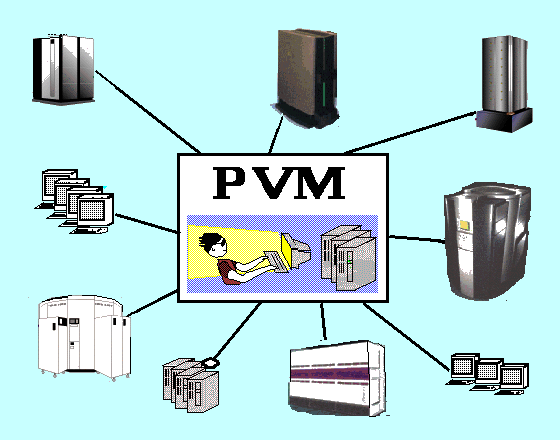Heterogeneous Distributed Computing


Hundreds of US industries save money by using PVM to exploit
the aggregate power of networked computers to solve their large
science, engineering, and medical problems.
PVM (Parallel Virtual Machine) is a software package
developed at Oak Ridge National Laboratory and the
University of Tennessee
that permits a collection of computers ranging from PCs to Crays
to be used as a single large parallel computer.
Thus companies and research labs can solve large computational problems
more cost effectively
by using the aggregate power and memory of existing computers.
PVM has become the de facto standard for distributed computing world-wide.
If a company uses computers, then PVM can help them.
The software enables users to exploit their existing computer
hardware to solve much larger problems at minimal additional cost.
Automotive, Aerospace, Chemical, Computer, Environmental,
Medical, Pharmaceutical, and Oil companies have saved millions of dollars
by using this software as a cost-effective way to design new products:
Hundreds of companies are using PVM to
solve important scientific, industrial, and medical problems.
The following is just a sampling of the many companies using PVM today:
Ford, Boeing, Sikorsky, United Technologies, Texaco, Dupont, General Electric,
Citicorp, JP Morgan Guaranty Trust, Siemens, Exxon,
TVA, Computational Biosciences Inc., Western Geophysical, Phillips Laboratory,
Mobil Oil, Consolidated Freightways Inc, US Grain Marketing Research Lab,
Elegant Mathematics Inc., IBM, Cray Research, Convex, and Shell Oil.
Recent PVM Highlights
 New PVM version released. PVM 3.3.8 July '95.
PVM 3.3 contains more new features than any previous PVM release
including: tracing, shared memory, faster communication routines,
modular interface for debuggers and schedulers, collective communication,
and I/O functions.
New PVM version released. PVM 3.3.8 July '95.
PVM 3.3 contains more new features than any previous PVM release
including: tracing, shared memory, faster communication routines,
modular interface for debuggers and schedulers, collective communication,
and I/O functions.
 XPVM 1.1 Available from netlib. June '95.
A new release of XPVM has been developed which is significantly
optimized to improve real-time animation of PVM programs and reduce
the system overhead that slows down and perturbs user applications.
An intense animation of a Cholesky matrix factorization that took
over 30 minutes in the original version now takes less than one
minute. In addition, new views and animations have been added to
enhance XPVM's ability to assist users in debugging and performance
tuning their programs. The new XPVM has an extended portability
and is fully compatible with existing and upcoming PVM releases.
XPVM 1.1 Available from netlib. June '95.
A new release of XPVM has been developed which is significantly
optimized to improve real-time animation of PVM programs and reduce
the system overhead that slows down and perturbs user applications.
An intense animation of a Cholesky matrix factorization that took
over 30 minutes in the original version now takes less than one
minute. In addition, new views and animations have been added to
enhance XPVM's ability to assist users in debugging and performance
tuning their programs. The new XPVM has an extended portability
and is fully compatible with existing and upcoming PVM releases.
 Convex, SGI, and DEC working with PVM Team on Shared memory port.
Convex in a move to bring their version of PVM in sync with
the public version is helping improve the PVM shared memory port.
They will continue to help with future releases.
This port and shared memory improvements are in PVM 3.3.8.
Convex will supply precompiled versions of PVM 3.3.8 to their customers.
Convex, SGI, and DEC working with PVM Team on Shared memory port.
Convex in a move to bring their version of PVM in sync with
the public version is helping improve the PVM shared memory port.
They will continue to help with future releases.
This port and shared memory improvements are in PVM 3.3.8.
Convex will supply precompiled versions of PVM 3.3.8 to their customers.
 Over 300,000 requests for PVM information have been received by NETLIB,
the primary distribution site for PVM source and documentation.
Over 300,000 requests for PVM information have been received by NETLIB,
the primary distribution site for PVM source and documentation.
1994 PVM Users survey results (450 pages) made available March '95
shows that the
number of PVM users continues to double each year.
 Over 180 US companies reply to PVM story in Industry Weekly and
R&D 100 magazine expressing interest in using PVM.
Companies included Ryder, Chrysler, Medical Foundation of Buffalo,
RCA, National Park Service, Allied Engine Corp. DELCO,
Westinghouse, Tandy, SRI, and many others.
Over 180 US companies reply to PVM story in Industry Weekly and
R&D 100 magazine expressing interest in using PVM.
Companies included Ryder, Chrysler, Medical Foundation of Buffalo,
RCA, National Park Service, Allied Engine Corp. DELCO,
Westinghouse, Tandy, SRI, and many others.
 PVM 3 wins 1994 R&D 100 Award for being one of the most
technologically significant products of the year.
PVM 3 wins 1994 R&D 100 Award for being one of the most
technologically significant products of the year.
 Commercial Support of PVM now available.
Several computer companies supply and support PVM
on their systems including: CRAY Research, IBM, Convex, DEC, Meiko,
HP, TMC, and SGI. Several small companies,
such as NAG and APOGEE Computing Inc.,
supply training and support for the public version of PVM.
Commercial Support of PVM now available.
Several computer companies supply and support PVM
on their systems including: CRAY Research, IBM, Convex, DEC, Meiko,
HP, TMC, and SGI. Several small companies,
such as NAG and APOGEE Computing Inc.,
supply training and support for the public version of PVM.
Slides (color postscript) presented to DOE August 3, 1995
Designed to be downloaded and printed for presentations.
PVM Overview (1.8MB)
XPVM highlight (8.2MB)
PVM/AVS highlight (4.0MB)
PVM research in FY'95 (0.3MB)
Planned research for FY'95 (0.3MB)
ORNL Network Research (0.3MB)
Contact
: pvm@msr.epm.ornl.gov
Al Geist
Oak Ridge National Laboratory
Box 2008
Oak Ridge, TN 37831-6367
phone: (423) 574-3153
Back to PVM HOME PAGE
.
Last Modified August 2, 1995 by (gst@ornl.gov)


